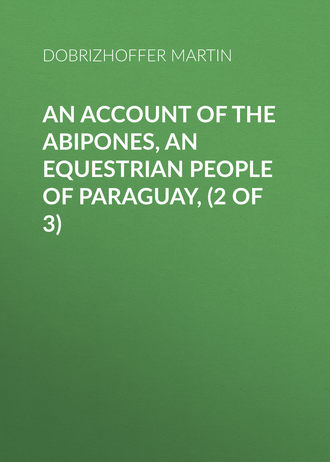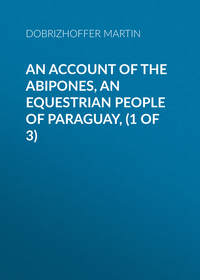 полная версия
полная версияAn Account of the Abipones, an Equestrian People of Paraguay, (2 of 3)
It is remarkable that many of the women arrive at this degree of honour, and nobility, enjoy the privileges of the Höcheri, and use their dialect. The names of these females end in En, as those of the men in In. What circumstances entitle women of low birth to this degree of honour, I do not know, but it appears to me most probable that the merits of their parents, husbands, or brothers, not age, or beauty, bestow this prerogative upon females. I have often heard very young women conversing in the language of the nobles, and matrons remarkable for years and wrinkles speaking the vulgar tongue.
The Abipones think it a sin to utter their own name. When either of them knocked by night at my door, though I asked him a hundred times, "Who are you?" he would answer nothing but, "It is I." Unknown persons, when I enquired their name, would jog their neighbour with their elbow that he might answer for them. It is also reckoned a crime to utter the name of a person lately dead. If any one in his cups forgets the law, and utters the name of the deceased, he will give occasion to a bloody quarrel. Many women have no name at all. When I was making out a list of the inhabitants of a town, I used to call upon all the men who were best acquainted with their hordesmen to give me information on the subject, and when interrogated respecting women, they used often to say: "This woman has no name."
Moreover, the Abipones change their names as Europeans do their clothes. The reasons of this alteration are either some famous action, or the death of a father, son, wife, &c. when all the relations, to signify their grief, change their old name for a new one. I have known persons, who, in process of time, changed their names six or more times. Others are named from some quality of mind or body; as Kauirin, lascivious, Oaherkaikin, mendacious. Children have names quite different from their parents. Amongst the Christian Guaranies, sons generally took the names of their fathers, and daughters of their mothers. In the third part of this history, which is yet to come, we shall relate the slaughters committed, and undergone by the Abipones, the progress and vicissitudes of the colonies which we founded for them, and the advantages which the Spaniards derived from those colonies.
END OF VOL. II1
I give the original Latin in this and other places, where the English does not fully express the meaning.
2
Assequor.


